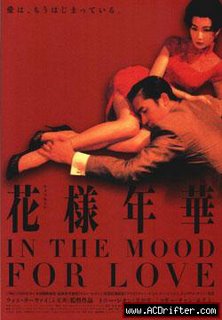 A similar situation originally led to my aunt and uncle getting it on. Perhaps they were less worried about lowering themselves to the level of their own errant spouses than Mr Chow and Mrs Chan.
A similar situation originally led to my aunt and uncle getting it on. Perhaps they were less worried about lowering themselves to the level of their own errant spouses than Mr Chow and Mrs Chan.Though I don't think it is entirely safe to assume − as many seem to − that this is a movie about the agonies of self restraint. ("The pining here is so graceful that you may be transfixed by it": Elvis Mitchell in the NY Times.) Wong Kar Wai originally shot several steamier scenes in room 2046 (a former British army building he converted into a hotel), but in the midst of his habitual pre-Cannes editing frenzy, chose to focus primarily on the painful forebearance. (Does that mean we should presume they never happened?)
When I first saw Fa yeung nin wa I didn't really know what to expect. This time I could sit back and soak up the elegance and inventiveness of the director's vision. So I picked up on the way the camera naturally adopts the perspective of a clandestine (or somewhat displaced) observer, from underneath a table or from just outside the room Mrs Chan is in, and amongst the scenes where the pair act out the betrayal that has thrown them together, I enjoyed the one where they each order food for the other as if for their unfaithful absent partner. (Neither of whom we ever see in full-face close up.)
Shigeru Umebayashi's Yumeji's Theme is indulgently haunting, though perhaps it gets a bit too much airtime over the course of the movie. Nat King Cole's efforts to croon boleros in his maladroit Spanish will always bring a smile to my face. (Akayoz oh-hoss vuurdez...) Maggie Cheung turns up in each scene with a different, wonderful, high-necked cheong-san dress.
Wong Kar Wai never uses scripts; everything is improvised. Which is why the film was shot in Macau rather than Beijing after the authorities demanded to see the finished text.
My original impressions of 2046 were "fidgety" but a second viewing thankfully cured me of that! With the 'sequel' fresh in my memory, it seems to me now that it wouldn't really matter which order you see these two films in. Wong Kar Wai ended up shooting them almost at the same time, and has said that there was a good degree of creative exchange between the two concepts as a result. That Chan helped Chow to write his pulp serials and that he had a secret to whisper into a hole seemed that much more significant. 2046 might more of a morass, but these days I think it is the better of the pair, though both are outstanding.

No comments:
Post a Comment